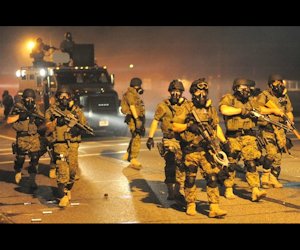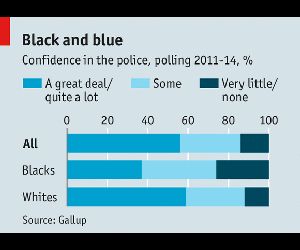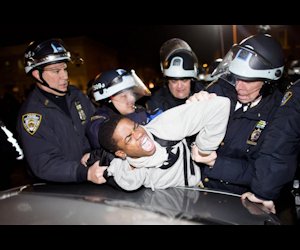Ferguson Revisited
 | | This is still unacceptable |
Over a month ago, I wrote about Ferguson believing that the Department of Justice report was going to reveal no evidence of institutional racism. My opinion was based on early reports that intimated this outcome, but now that the report has finally been released, I must admit I was spectacularly wrong. Not only was I wrong to believe the DOJ wouldn't find evidence of racism, but I was wrong to believe that there wasn't an inherent racial bias in the Ferguson police department.
To be clear, the situation is far from simple. I still believe that the arc of law enforcement bends more towards the wealthy than just the white, that minorities are more likely to be poor than white people, and that the days of abject racism are behind us. I also still believe that the vast majority of police officers and law enforcement officials--even in Ferguson--are not inherently racist people. I also still think that Officer Darren Wilson has been almost completely vindicated, that the "hands up" narrative is patently false, and that Michael Brown is hardly the innocent child the protestors would have you believe. However, reading over the report, it is impossible to conclude that racism isn't an insidious factor in the Ferguson Police Department.
 | | There's a reason for this |
Michael Brown's death sparked this whole thing and is the reason the Department of Justice conducted its investigation. At the same time, though, I think putting all of Ferguson's institutional problems on the shoulders of a single cop during a single shooting detracts from the real issues. Indeed, as facts came out concerning the Brown shooting, it became all too easy to conclude, as I did, that since the Brown narrative is fatally flawed, the accusations of injustice laid at the feet of the Ferguson PD are also flawed. This, it turns out, is poor logic.
Modern racism in America is nothing like it was a couple of generations ago. Instead of being out in the open, it's more subtle. Don't worry; I'm not going to start defending people who cry about "micro-aggressions" or other such nonsense. What I am going to talk about is how a simple, racial assumption can lead to what we see happening in Ferguson. Going from the information contained in the report (and if you haven't read it yet, you really owe it to yourself to do so), this is how I think it developed.
Say you start with the assumption that poor, black neighborhoods are more likely to have high crime rates than middle-class, white neighborhoods. From a purely statistical point of view, this is a fact. But if you start with this assumption and then you get charged with running the police department and delivering both high conviction rates and high revenue, you'd probably start putting cops in black neighborhoods and telling them to cite even the most petty crimes. This leads to the impression--a correct one, it turns out--that the police treat black people more harshly than they treat white people. This is even true in police departments run almost entirely by black people (just look at the Detroit numbers if you don't believe me).
Add to this the growing depersonalization of law enforcement, the ever-increasing militarization of police officers, cities like Ferguson that are desperately struggling to meet ludicrous revenue demands, terrible cop wages and benefits, and less stress being put on community service and personality screening, and things go sour fast. It's been happening in Ferguson for many, many years, and I'm willing to believe that Ferguson is far from an isolated case.
 | | It's not just Ferguson |
In other words, we have a serious, institutional problem. There's definitely a racial element to it, but it doesn't end there, not by a long stretch. We need a paradigm shift in law enforcement. We need to spend less money on riot gear and tear gas while spending more money on our officers. We need to stop using the police department as a generator of revenue--that creates a perverse incentive to form an ever-expanding police state--and we need to stop letting cops get away with driving around with their windows up instead of walking the beat and interacting with members of the communities they serve. But still, it doesn't end there. Decriminalizing non-violent drug offenses, reforming civil asset forfeiture, ending mandatory minimums, taking an empirical look at prison reform that focuses on rehabilitation over deterrence, and much more could all help take us off the terrible road we find ourselves on. If we could affect changes such as these, perhaps the tragedy of Ferguson won't be meaningless or recurrent.
Police officers still require our support, respect, and admiration. No matter the politics that have perverted the justice system, the cops are still our protectors, not our enemies. Sure, there are plenty of assholes out there--even unquestionably racist ones--who have been given a badge, a gun, and far more power than they deserve, but focusing your anger at them is like treating the headache instead of curing the cancer. Blame the people who give these assholes their power, who encourage their behavior with outlandish demands for bigger numbers, and who decide that armored personnel carriers are a better investment than non-lethal tactical training.
-e. magill 3/17/2015
|
|